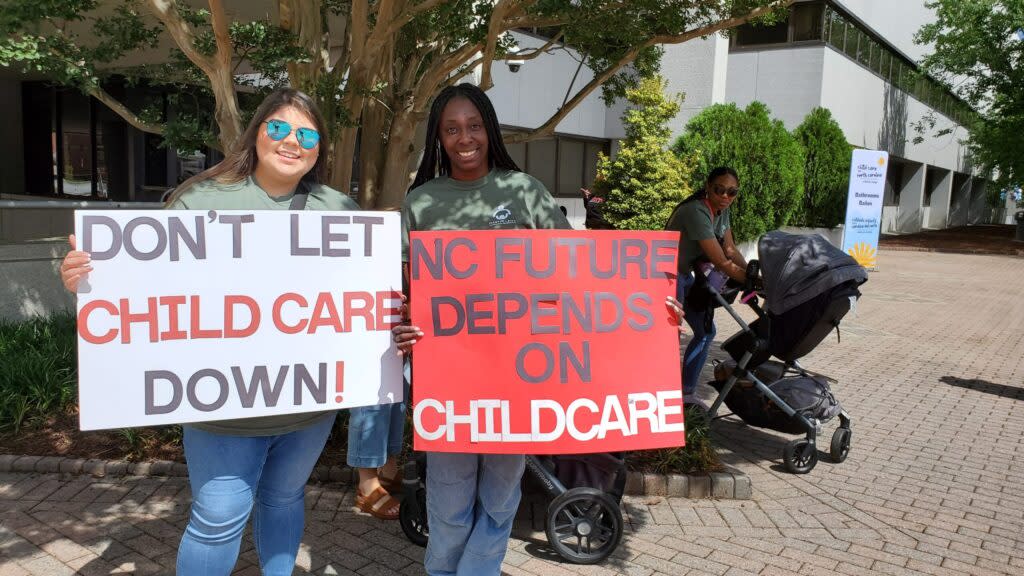Monday numbers: NC’s childcare industry awaits a state budget and a lifeline

Child care workers press NC legislators to fund their industry as federal stabilization grants sunset. (Photo: Clayton Henkel)
All eyes will be on the North Carolina House this week as leadership prepares to roll out its recommended budget adjustments for the coming year. A looming and unanswered question remains whether the House (and the Senate) will agree to appropriate $300 million to keep North Carolina’s child care facilities open when federal stabilization grants sunset at the end of this month.
Childcare workers have been making the case for months now, warning that without financial support from the state, three in 10 childcare programs could close — something that would impact as many as 90,000 children.
With the industry facing this funding cliff, the U.S. Chamber Foundation along with the NC Chamber Foundation and the children’s advocacy group NC Child commissioned a survey of North Carolina parents with children under the age of six to assess the direct financial impact of insufficient childcare coverage on North Carolina’s economy.
Here’s what they found: Childcare issues result in an estimated $5.65 billion annual loss for North Carolina’s economy.
Without safe, affordable childcare, parents don’t go to work. Businesses are left understaffed or forced into a cycle of retraining new workers.
“The health of North Carolina’s economy is directly tied to the strength of its workforce. This survey shows that our state is not realizing its potential when it comes to both families and economic competitiveness,” said Meredith Archie, President of the NC Chamber Foundation, in releasing the report last week.
This week’s Monday numbers column, takes a closer look at the findings from the report, “Untapped Potential.”
35 – of the parents who say they experienced disruptions to their work in the last year, the percentage who reported leaving the workforce as a direct result of issues with childcare
$4.29 billion – the annual estimated cost of childcare-related employee turnover and absenteeism for North Carolina employers
$1.36 billion – the annual amount in tax revenue that North Carolina misses out on due to turnover and absences stemming from childcare issues
15 – the percentage of working parents who are planning to leave their employment over the next 12 months
46 – the percentage of parents attending school or worker training who needed to make a significant adjustment to their schedule due to childcare issues in the past year
24 – the percentage of parents who said they have worked (onsite or virtually) over that last six months while simultaneously caring for a child
22 – the percentage of parents who said they have worked fewer hours over that last six months to provide childcare
23 – the percentage of parents who said they have alternated work hours with another member of the household over that last six months to provide childcare
12 – the percentage of parents who say they have delayed entry into the job market because of childcare issues
51 – the percentage of North Carolinians who departed from their education due to childcare issues who anticipate waiting at least a year before returning to their course of study (another 5% said they either did not plan to return or did not know when they would be able to
return to their education)
$9,255 – the average annual cost for full-time childcare at childcare centers in North Carolina for an infant.
$7,592 – the average annual cost for full-time childcare at childcare centers in North Carolina for a 4-year-old.
According to the report, low-income families more often use price as the sole deciding factor when choosing their childcare setting as compared to parents with higher incomes, who may consider other factors like quality and proximity to work.
Erica Palmer Smith, executive director of NC Child, summed it up this way:
“Quality early childhood education lays the foundation for our children during the most formative years of their lives. Further, we know that childcare access helps parents maintain employment, which is critical for supporting their children. This research clearly shows the importance of investing in the childcare system here in North Carolina.”
Click here to read the full Untapped Potential report.
The House Appropriations Committee will take up their proposed spending plan Tuesday at 9:00am.
The post Monday numbers: NC’s childcare industry awaits a state budget and a lifeline appeared first on NC Newsline.

